August 14, 2023 •
FEC Responds to Petition Concerning Deceptive Artificial Intelligence in Campaign Ads
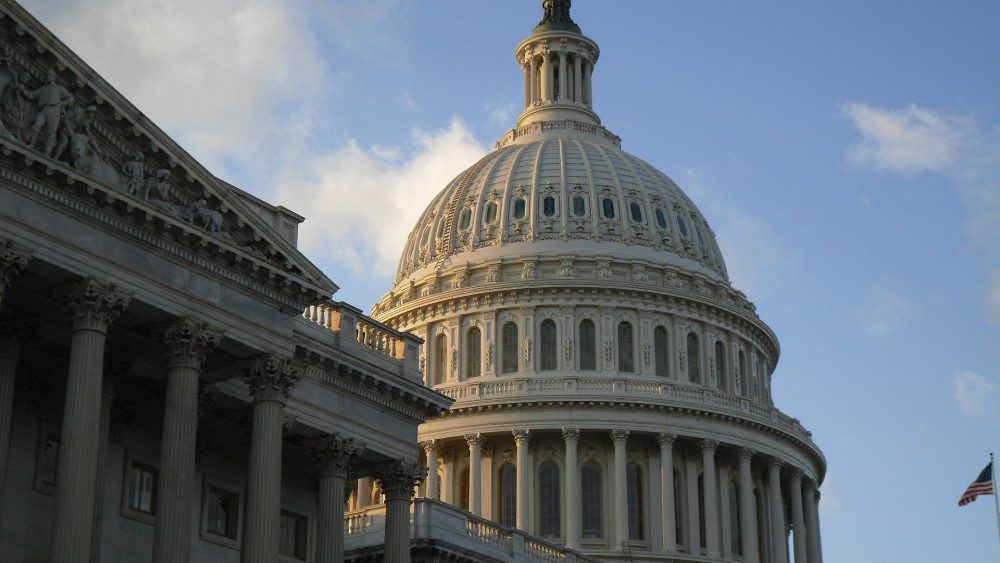
On August 10, the Federal Election Commission moved a step closer to addressing “deliberately deceptive Artificial Intelligence (AI) campaign advertisements.” On July 13, the commission had received a Petition for Rulemaking asking the FEC to make it clear that the […]
On August 10, the Federal Election Commission moved a step closer to addressing “deliberately deceptive Artificial Intelligence (AI) campaign advertisements.”
On July 13, the commission had received a Petition for Rulemaking asking the FEC to make it clear that the related statutory prohibition applies to deliberately deceptive AI campaign advertisements.
In response, the FEC issued REG 2023-02 (Artificial Intelligence in Campaign Ads) Draft Notification of Availability to seek written public comments on the Petition.
The notification will be published in the Federal Register at a future date along with the deadline for comments, according to the FEC press release.
February 10, 2023 •
FEC Updates Lobbyist Bundling Disclosure Threshold
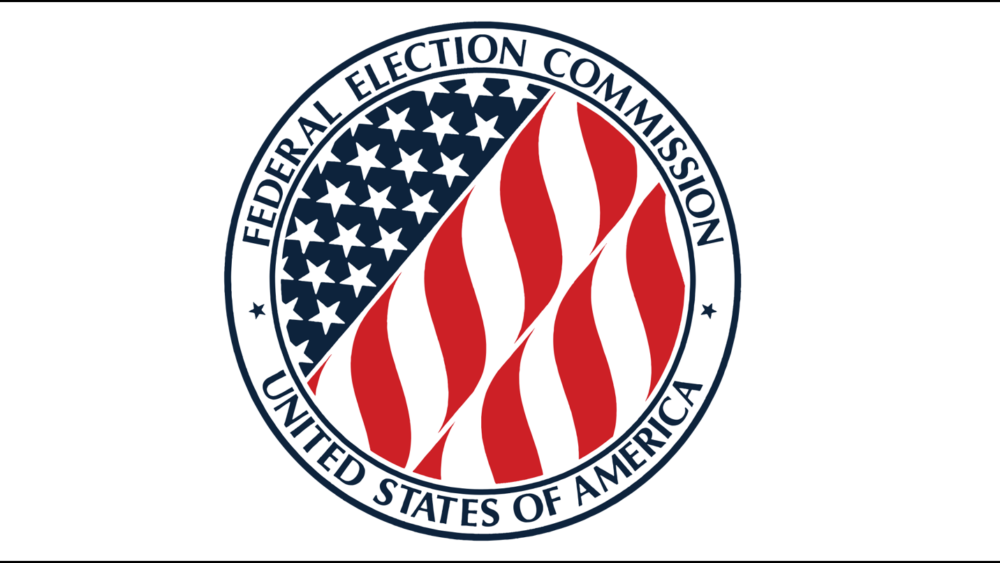
The Federal Election Commission (FEC) published its price index adjustments for expenditure limitations and the federal lobbyist bundling disclosure threshold. The lobbyist bundling disclosure threshold has increased for 2023 from $20,200 to $21,800. This threshold amount is adjusted annually. Federal […]
The Federal Election Commission (FEC) published its price index adjustments for expenditure limitations and the federal lobbyist bundling disclosure threshold.
The lobbyist bundling disclosure threshold has increased for 2023 from $20,200 to $21,800.
This threshold amount is adjusted annually.
Federal law requires authorized committees of federal candidates, leadership political action committees (PACs), and political party committees to disclose contributions bundled by lobbyists and lobbyists’ PACs.
March 18, 2019 •
Oklahoma Increases Political Contribution Limits
Political candidates in Oklahoma will be able to accept $2,800 per election from individuals the next time they run. The Federal Election Commission increased the individual contributions limit $100 to account for inflation. It is the first increase in four […]
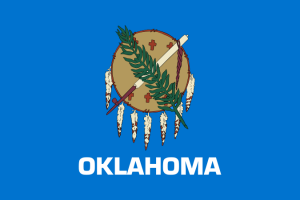 Political candidates in Oklahoma will be able to accept $2,800 per election from individuals the next time they run.
Political candidates in Oklahoma will be able to accept $2,800 per election from individuals the next time they run.
The Federal Election Commission increased the individual contributions limit $100 to account for inflation. It is the first increase in four years.
The limit increase applies to primary, runoff primary, and general election ballots in 2020, as well as candidates in any special election this year.
February 7, 2019 •
FEC Request for Comments on Comments Extended to March 4
The Federal Election Commission (FEC) has extended its deadline for seeking public comments on proposals for rules establishing specific time periods for the submission of public comments on drafts of advisory opinions. The comment period was originally scheduled to end […]
 The Federal Election Commission (FEC) has extended its deadline for seeking public comments on proposals for rules establishing specific time periods for the submission of public comments on drafts of advisory opinions.
The Federal Election Commission (FEC) has extended its deadline for seeking public comments on proposals for rules establishing specific time periods for the submission of public comments on drafts of advisory opinions.
The comment period was originally scheduled to end on February 1. Because of the recent partial government shutdown, the FEC chose to extend the comment period for 30 days, ending on March 4.
In 2016, a Petition for Rulemaking was received by the FEC requesting the Commission modify 11 CFR §112.3 and codify procedures establishing specific time periods for public comments on drafts of advisory opinions before the Commission votes on the drafts.
The petition, filed by Make Your Laws PAC, Inc., Make Your Laws Advocacy, Inc., Make Your Laws, Inc., and Dan Backer, Esq., additionally asks the Commission to amend existing regulations to require that, when the Commission makes public multiple drafts of an advisory opinion, the Commission indicate the differences between those drafts.
The FEC also extended the comment deadline to March 4 for the rulemaking concerning the regulatory definition of contribution.
After the comment period is over, the FEC will consider the merits of the petition.
December 10, 2018 •
FEC Seeks Comments on Comments
The Federal Election Commission (FEC) is seeking public comments on proposals for rules establishing specific time periods for the submission of public comments on drafts of advisory opinions. These comments must be submitted on or before February 1, 2019. In […]
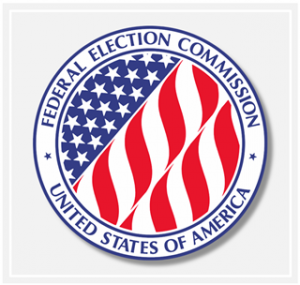 The Federal Election Commission (FEC) is seeking public comments on proposals for rules establishing specific time periods for the submission of public comments on drafts of advisory opinions. These comments must be submitted on or before February 1, 2019.
The Federal Election Commission (FEC) is seeking public comments on proposals for rules establishing specific time periods for the submission of public comments on drafts of advisory opinions. These comments must be submitted on or before February 1, 2019.
In 2016, a Petition for Rulemaking was received by the FEC requesting the Commission modify 11 CFR §112.3 and codify procedures establishing specific time periods for public comments on drafts of advisory opinions before the Commission votes on the drafts.
The petition, filed by Make Your Laws PAC, Inc., Make Your Laws Advocacy, Inc., Make Your Laws, Inc., and Dan Backer, Esq., additionally asks the Commission to amend existing regulations to require that, when the Commission makes public multiple drafts of an advisory opinion, the Commission indicate the differences between those drafts.
After the comment period is over, the FEC will consider the merits of the petition. The notice of availability for the submission of public comments was issued in the December 3 Federal Register.
August 7, 2018 •
FEC Disclosure Regulation Invalidated by Court for Being Too Narrow
On August 3, a federal court ruled a campaign finance disclosure regulation, followed for decades by the Federal Election Commission (FEC), failed to uphold disclosure requirements required by a federal statute. Chief Judge Beryl A. Howell of the United States District […]
 On August 3, a federal court ruled a campaign finance disclosure regulation, followed for decades by the Federal Election Commission (FEC), failed to uphold disclosure requirements required by a federal statute. Chief Judge Beryl A. Howell of the United States District Court for The District of Columbia issued an order, in CREW v. FEC, vacating 11 C.F.R. §109.10(e)(1)(vi), but stayed the vacatur for 45 days to give time for the FEC to issue interim regulations comporting with the statutory disclosure requirements of 52 U.S.C. §30104(c). The court also has allowed the FEC 30 days to change an earlier FEC dismissal to conform with the court’s ruling.
On August 3, a federal court ruled a campaign finance disclosure regulation, followed for decades by the Federal Election Commission (FEC), failed to uphold disclosure requirements required by a federal statute. Chief Judge Beryl A. Howell of the United States District Court for The District of Columbia issued an order, in CREW v. FEC, vacating 11 C.F.R. §109.10(e)(1)(vi), but stayed the vacatur for 45 days to give time for the FEC to issue interim regulations comporting with the statutory disclosure requirements of 52 U.S.C. §30104(c). The court also has allowed the FEC 30 days to change an earlier FEC dismissal to conform with the court’s ruling.
The case originated because of independent expenditures made in a 2012 Ohio senate race by the non-political social-welfare nonprofit Crossroads Grassroots Policy Strategies (Crossroads GPS), an affiliate of the American Crossroads Super PAC. Crossroads GPS did not report donors when reporting its independent expenditures, while it acknowledged receiving contributions over $200, arguing the donors did not donate funds directly tied to any specific reported expenditure, as the FEC interpreted 11 C.F.R. §109.10(e)(1)(vi) to require. Non-political committees making independent expenditures over $250 in a calendar year must comply with disclosure obligations closely analogous to those imposed on political committees.
The vacated regulation required the identification of each person who made a contribution in excess of $200 to the person filing a disclosure report, including for non-political 501(c)(4) non-profits entities making independent expenditures, if the contribution was made for the purpose of furthering the reported independent expenditure. The court found the regulation, as construed and applied by the FEC, did not require the disclosure of donors, absent the donor’s express agreement that the funds be used for the specific expenditures reported to the FEC, even though the donor may otherwise support and in fact contribute for the purpose of funding those expenditures. The court found the regulation impermissibly narrows the mandated disclosure in 52 U.S.C. §30104(c)(2)(C), which requires the identification of such donors contributing for the purpose of furthering the non-political committee’s own express advocacy for or against the election of a federal candidate, even when the donor has not expressly directed that the funds be used in the precise manner reported.
February 9, 2018 •
Commissioner Goodman Resigns from FEC
On February 7, Commissioner Lee E. Goodman submitted his resignation from the Federal Election Commission (FEC) to the White House. The effective date of his resignation is February 16. Goodman, who joined the FEC in 2013 and was chairman in […]
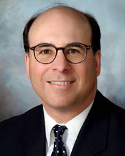 On February 7, Commissioner Lee E. Goodman submitted his resignation from the Federal Election Commission (FEC) to the White House.
On February 7, Commissioner Lee E. Goodman submitted his resignation from the Federal Election Commission (FEC) to the White House.
The effective date of his resignation is February 16.
Goodman, who joined the FEC in 2013 and was chairman in 2014, intends to practice law with the law firm Wiley Rein LLP in Washington, DC, according to an FEC press release.
May 24, 2017 •
FEC Launches Redesigned Website
Today, the Federal Election Commission (FEC) launched a newly revamped website. The new website has been in public beta form since October 2015. The organization of the website is broken down into three main areas: campaign finance data, candidate and […]
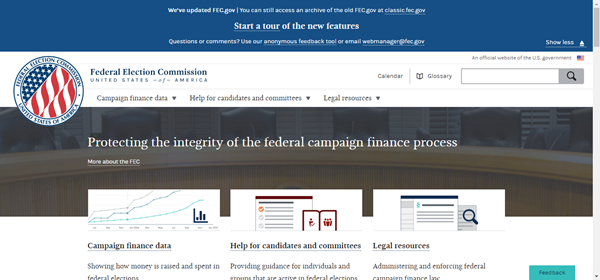 Today, the Federal Election Commission (FEC) launched a newly revamped website. The new website has been in public beta form since October 2015.
Today, the Federal Election Commission (FEC) launched a newly revamped website. The new website has been in public beta form since October 2015.
The organization of the website is broken down into three main areas: campaign finance data, candidate and committee information and help, and legal resources. Included in the redesigned website’s new infrastructure is increased HTTPS security and database synchronization and new search functions and visual graphics meant to create an easier user experience.
An archive of the old FEC website is still available at http://classic.fec.gov and is still being used for links not yet brought forward into the updated website.
February 23, 2017 •
FEC Commissioner Ravel Resigns Effective March 1
On March 1, Commissioner Ann M. Ravel will resign from the Federal Election Commission (FEC). In her February 19 resignation letter to the president, Commissioner Ravel urged he prioritize campaign finance reform, strengthen disclosure law, and “reduce reliance on the […]
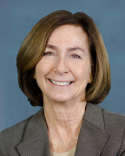 On March 1, Commissioner Ann M. Ravel will resign from the Federal Election Commission (FEC). In her February 19 resignation letter to the president, Commissioner Ravel urged he prioritize campaign finance reform, strengthen disclosure law, and “reduce reliance on the wealthy.”
On March 1, Commissioner Ann M. Ravel will resign from the Federal Election Commission (FEC). In her February 19 resignation letter to the president, Commissioner Ravel urged he prioritize campaign finance reform, strengthen disclosure law, and “reduce reliance on the wealthy.”
With Ravel’s absence, there will be three registered members of the Republican Party and two registered members of the Democratic Party on the Commission. The FEC requires at least four commissioners to agree for any official action. A replacement for Ravel will be selected by President Trump and must be confirmed by the U.S. Senate.
While not more than three members of the commission may be registered with the same political party, the president is not obligated to nominate a member of the Democratic Party, of which Ravel is a registered member.
January 13, 2017 •
FEC Unable to Agree on Rulemaking Concerning Foreign Influence on Political Spending
On January 12, the Federal Election Commission (FEC) was unable to agree on a policy to clarify when and if a U.S. domestic subsidiary corporation of a foreign national is illegally involved in political activity. Federal law prohibits foreign nationals from […]
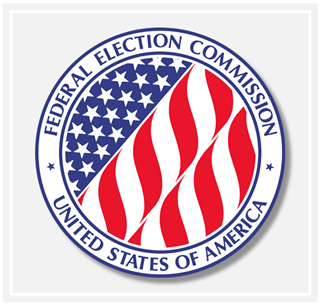 On January 12, the Federal Election Commission (FEC) was unable to agree on a policy to clarify when and if a U.S. domestic subsidiary corporation of a foreign national is illegally involved in political activity.
On January 12, the Federal Election Commission (FEC) was unable to agree on a policy to clarify when and if a U.S. domestic subsidiary corporation of a foreign national is illegally involved in political activity.
Federal law prohibits foreign nationals from directly or indirectly making contributions, donations, expenditures, independent expenditures, and disbursements in connection with federal, state, or local elections. FEC regulations also prohibit foreign nationals from directing, controlling, or participating in the decision-making process of any person, such as a corporation, with regards to decisions concerning the making of contributions, donations, expenditures, or disbursements in connection with elections in the U.S.
Additionally, the FEC was unable to reach an agreement on the creation of a safe harbor for political committees to accept corporate contributions deemed not to have come from foreign national sources.
In response, Vice Chair Caroline C. Hunter and Commissioners Matthew S. Petersen and Lee E. Goodman issued a statement.
A previous attempt to reach an agreement on this issue in September also failed.
State and Federal Communications, Inc. provides research and consulting services for government relations professionals on lobbying laws, procurement lobbying laws, political contribution laws in the United States and Canada. Learn more by visiting stateandfed.com.

